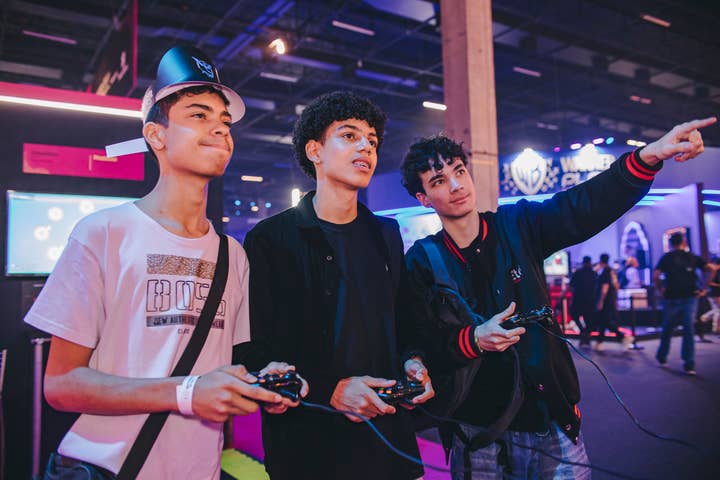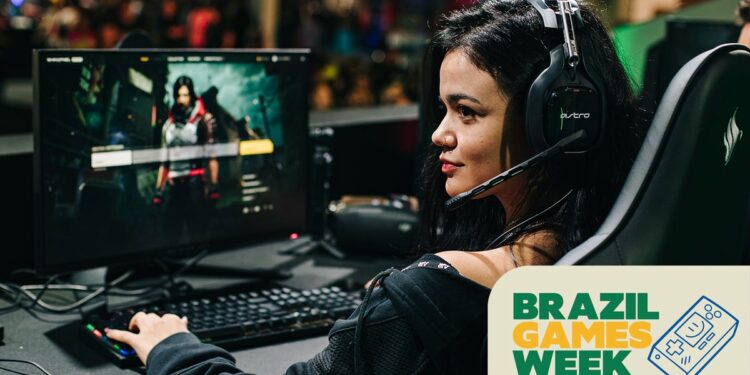Brazil is one of the biggest emerging games markets in the world, and a vital territory for anyone wishing to be successful in Latin America.
The region’s games scene has grown rapidly over the past 15 years – something GamesIndustry.biz’s Marie Dealessandri dives deeper into with our Brazilian games industry in numbers feature. But the local industry actually dates back to the 1980s, with a handful of Brazilian developers making video games.
By the 1990s, games had become a little more popular but it was difficult for consumers to gain access to them due to a government block on technology imports.
“The government back then thought it was a good idea to develop our own technology,” explains Rodrigo Terra, president of trade body Abragames, “which is a good concept but blocked everything coming in. You could not import computers or consoles.
“What happened? Clones. The Famiclones, right? With clones here, video games started to be something in the country.”
There was one notable exception; Sega made a deal with Brazilian games firm Tectoy to manufacture its consoles, including Master System and Genesis, making it easier to release them in Brazil. This also helped fuel interest in video games, and inspired some Brazilians to make their own, but developers still struggled to secure the equipment they needed to create games due to the block on imports.
As CD-ROMs took off as a format, more windows of opportunity were opened, but Terra says the industry did not begin in earnest until Steam launch in the early 2000s. Digital distribution gave developers a new way to reach their audience, and the rise of accessible engines such as Unity gave more people the power to start their own studios.
The Brazilian games market really started to ramp up around 2010 as the smartphone became more popular. The government of the time once again wanted Brazil to focus on making its own tech and introduced policies that allowed mobile manufacturers to produce their devices in the country.
Rodrigo Terra, Abragames | Image credit: Abragames
“Consoles were always expensive, but because smartphones were being manufactured here, they dropped the price a lot,” Terra says. “People were playing games more and more. Seeing this movement, the developers – with the digital distribution and starting to work with PC – thought, ‘Okay, maybe there is a way to run a business around this.’ More than 100 companies then started to make games.”
When Abragames was founded in 2004, there were only around 30 games companies across the whole of Brazil. By 2018, there were 400 – and today there are more than 1,000. The rise of mobile also had a lasting impact on consumers, becoming the most popular platform for games (as it is in most markets around the world). There is also a solid base of PC players – as you’ll see in our ‘Brazilian games industry in numbers’ report, this format was only overtaken by consoles in the last two years – because the price of PlayStation, Xbox and Nintendo devices remains too high for most consumers.
“You see PlayStation publishing former exclusives from their consoles on PC, and one of the reasons for that is Latin America,” says Terra. “PC is the second largest platform for games down here, and Latin America is one of the fastest growing regions for game consumers.
“Consoles here are really expensive. In the US, they sell for $500 – which I still think is expensive – but here, you’re going to pay $1,000. For $1,000 you can buy a good PC, so if you’re investing in something to play games that’s not a phone, you’re going to invest more in a PC than you will a console. Brazil is still pretty good for PlayStation as a market, but the population will be choosing between a tool that can be productive and run games, or a console that can just do games for the same amount of money.
“I don’t see mobile being replaced by any other platform any time soon.”
“You see PlayStation publishing former exclusives from their consoles on PC, and one of the reasons for that is Latin America”
Rodrigo Terra, Abragames
With a population of over 200 million, Brazil is the fifth largest games market in the world by active players. However, it’s only the tenth biggest when it comes to games spending – in part, due to the nation’s taste for free-to-play mobile games and the smaller console market, but also due to the lack of major Brazilian-developed titles. We ask both trade bodies how this disparity might be addressed.
“That’s the question we’ve faced since 2001,” says Terra. “Back in the 90s, there were only American, Japanese, and European titles, no Brazilian ones, so the game culture here was born with IP from other places. That’s one thing.
“The second is marketing. Big companies do heavy marketing here because we have a large consumer audience, and they don’t market indie titles, just AA and AAA. We don’t see Brazilian titles being marketed here, even if it’s by a big publisher or platform holder. I think that has an impact on the population. It’s the same thing with movies — we watch a lot of American movies.
“There is a struggle to show to the Brazilian population that Brazilian games are as good or even better than anything you can play from outside. But we still don’t have the AA or AAAs that people like to play. It’s a niche that plays indie games, and our expertise is too grounded in indie games. It’s a matter of giving more exposure to Brazilian games on big platforms, of marketing these games to the Brazilian audience.”
Eros Silva of trade body Apex Brasil agrees, adding that much of that marketing weight comes from larger publishers, and it’s hard for micro-studios to grab their attention.
“Plus, as you know, Brazil does not have too many publishers compared to what you see in the United States or Europe. We have tried to change that, and we have seen some movement – for example, Tectoy just launched their publishing service.
“In time, we are going to see more investments here to create new publishers and these publishers will reach these small companies to publish their games. So it’s something that we have to change over the next five years. As we get more publishers, more of this revenue will stay here in Brazil.”

Horizon Chase by Aquiris (now Epic Games Brasil) is an example of a successful Brazil-made games IP | Image credit: Aquiris Game Studio
Developing games in Brazil
Despite the ongoing limitations on tech imports – which make it harder for studios to bring dev kits and other equipment into the country – Brazil is otherwise fairly well suited to becoming a hub for games development. For example, each city across the country’s 25 states has solid access to the internet.
“We have very good infrastructure,” says Silva. “We also have access to different governmental programs like Invest São Paulo, which has different projects that bring this specific game infrastructure to places that do not have it or do not have money to afford equipment. And it’s not only São Paulo – in different states, we have city hall programs that bring gaming culture to the population.
“Energy is not too expensive either. We say that Brazil is the place of endless, clean energy. Nowadays, we have very good Brazilian energy that comes from wind, solar, and hydroelectric dams. So we have energy, we have infrastructure, we have very good internet, and we have equipment that’s affordable for most of the programmers.”
Brazil’s education infrastructure is also improving with more universities investing in gaming-specific courses, as opposed to the general programming qualifications that aspiring developers would study for. Silva adds that established studios – such as Kokku, one of Brazil’s largest games companies – are also doing their part to give more people the chance to find a career in games.
“Kokku hires students from poor areas, ones that do not have any money to buy computers or to invest in an educational program, and they teach them how to be an artist, a programmer, and so on. And these programs are widespread among companies here in Brazil.”

Eros Silva, Apex Brasil | Image credit: Apex Brasil
Terra adds that the recent addition of more graduation, post-grad and free online courses in Portuguese, Brazil’s national language, has also had an impact: “That was really important because now people can learn not just in English. Now they have the knowledge of making games in Portuguese. And this talent is starting to open [new] companies.”
Anecdotally, he adds that translating video games into Portuguese boosts their appeal in Brazil, as Nintendo found when it did so with The Legend of Zelda: Tears of the Kingdom.
Over the past ten years, however, Brazil has suffered a ‘brain drain’ problem, as senior and skilled talent found employment at larger companies in other countries. While some have been able to work remotely since the pandemic, many have emigrated and much of that talent has yet to return to Brazil.
Silva says that studios from various countries often have a presence at Brazil’s business fairs and events like BIG Festival or Gamescom Latam,
“We can do nothing about that because it’s almost impossible to forbid this kind of movements,” says Silva. “It’s something that you have to live with.”
His suggested solutions include finding ways to help Brazilian studios compete better for talent and improving their ability to hire.
“Only 15% of Brazilian studios are willing to accept foreign investments or VC investments… We are trying to figure out [why]”
Eros Silva, Apex Brasil
Silva adds that some folks have been returning in recent years in less than ideal circumstances, caught up by the layoffs that continue to sweep the industry. When asked whether Brazilian games firms have been similarly affected, Silva acknowledges that there have been some layoffs, but not on the scale seen elsewhere in the world.
“Actually, we have seen companies hiring more than laying off and that’s because here we have a very good infrastructure,” he adds. “We are well positioned in Latin America because we [in the same timezone as] the United States, and we sell a lot to the United States and Canada. And we have seen European companies [working with Brazilian studios] to take advantage of the dollar rate because [its] very competitive here.”
Another reason Brazil has been less affected by the ongoing layoffs is that the vast majority of its native developers – Terra estimates around 90% – are micro studios. An interesting result of this is that 93% of Brazilian developers are making their own IP, and some of them have fared well outside of their home market. Games that were developed in Brazil include the Horizon Chase franchise by Epic Games Brasil (formerly Aquiris) and Behold Studio’s Knights of Pen & Paper (we’ll have an interview with Behold later this week).
There are a handful of larger companies – such as Wildlife, Puga Studios and Kokku (now part of OV Entertainment) – but the majority work on outsourcing and co-development for studios in the West. Puga, for example, has provided art for Tiny Tina’s Wonderlands, while Kokku has worked with Guerrilla on both Horizon games. There has yet to be a AAA original IP from Brazil, but Terra is confident that will change in future.
“We used to struggle to present Brazilian IPs to audiences. When it comes to Brazilian IPs, we still don’t have a major hit but that’s just a matter of time, [of] a few years to have a pretty well known IP.
“We are creating room for the companies that want to explore and invest in IPs, to become healthier and stronger so they can risk doing more ambitious titles as AA. Maybe in the future we’ll have a resident AAA, but many companies here now are doing AA, mostly as work-for-hire.”

Events like Gamescom Latam are drawing more attention to the Brazilian games industry | Image credit: Gamescom Latam
Investing in the future
Part of that drive to create more popular Brazilian games IPs will rely on investment. There’s a big focus on pouring more money into the nation’s games scene, to grow it further and capitalise on the expansion seen throughout the past decade – and a crucial opportunity has now presented itself.
In May, we reported that Brazil has adopted a new legal framework that redefines video games as a separate industry and lays the groundwork for new regulations and policies specific to this sector. We’ll be going into more detail about the framework’s potential impact on Brazil tomorrow, but suffice it to say this has opened a lot of doors that should help significantly grow the local industry.
“We need more investment here to [attract] publishers that are looking for Brazilian titles,” Terra says. “These investments need to tackle the problem that we don’t have many medium or big companies. If you have a small studio, you need to wait five years to make them grow and then be able to create larger and more ambitious titles.
“Now we have the legal framework, I think we will have the amount of investments that we need so these companies that are small now will become wealthy, healthy companies in two or three years, [and then] take larger risks for more ambitious titles.”
“There is a struggle to show to the Brazilian population that Brazilian games are as good or even better than anything you can play from outside”
Rodrigo Terra, Abragames
However, Silva adds that simply making more money available will not instantly solve some of the challenges the Brazilian industry faces. There’s a mindset among developers that’s resistant to taking this funding, especially from overseas.
“Only 15% of Brazilian studios are willing to accept foreign investments or VC investments,” he explains. “The rest is self-funded, money from the family, or government projects funding games. We are trying to train Brazilian companies, even micro-companies, to be willing to accept investment. That’s our main challenge for the next two years.”
You would think indies would jump at the chance to have their projects funded, so why is there this reluctance?
“We are trying to figure that out,” Silva laughs. “The problem is the micro-companies stay micro for tento 15 years. Why? Because some Brazilian artists or programmers see their games as art. The Brazilian government funding… it’s not the best but it’s something so they can survive.
“But we are trying to figure out how to improve that. We need more businessmen than artists, or at least to find a balance… Next year at Gamescom Latam, we are trying to bring venture capitalists and companies that receive venture capital from outside Brazil to teach the local community [about investment], and trying to make this a place where [founders] feel safe [and] understand they are not going to lose their company to venture capitalists or investors.”
We’ll be bringing you more from Brazil all this week as part of our latest territory special, and you can follow all the coverage right here.
Source link : http://www.bing.com/news/apiclick.aspx?ref=FexRss&aid=&tid=66f16c85dce54d448ea1fcf7030bed42&url=https%3A%2F%2Fwww.gamesindustry.biz%2Fbrazil-a-nation-of-small-studios-with-a-big-future&c=12691391731072453157&mkt=en-us
Author :
Publish date : 2024-09-23 01:28:00
Copyright for syndicated content belongs to the linked Source.










